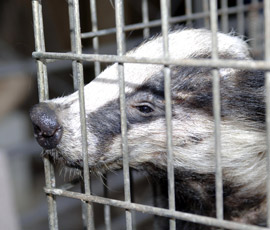Glos badger cull goes on despite missing target

The pilot badger cull must continue in Gloucestershire despite marksmen failing to kill enough badgers to reach their targets, the government has insisted.
DEFRA said marksmen removed 708 badgers in the six-week pilots in west Gloucestershire – only about 30% of the revised target of 2,350 badgers in the area (News, 11 October).
The aim was to cull 70% of badgers in the pilot areas of Somerset and west Gloucestershire using a combination of cage trapping and controlled shooting.
The six-week cull ended in Gloucestershire on Tuesday (15 October), but Gloscon, the company carrying out the culling in the county, has applied for a licence to extend the culls up to 1 December, the closed season for cage-trapping badgers.
Last week, Natural England granted marksmen a licence to extend the cull in Somerset for a further three weeks until 1 November after 850 badgers were killed in the time frame, about 60% of the estimated population.
Natural England confirmed that Gloscon has applied for an extension, which was likely to be processed by Friday (18 October).
A DEFRA spokesman said the shortfall did not mean that the cull was a failure.
“Early indications are that this method of culling, without wishing to pre-empt the findings of the panel of independent experts, is safe and humane,” he added.
“Where culling has taken place, it’s fair to say it has been effective. It’s just taking a little longer than anticipated.”
“We’ve already learned from both areas that culls will need more time in the future. The pilots will continue for four years, and the science tells us that they will reduce TB in both areas.”
DEFRA secretary Owen Paterson
The spokesman said in the future the period for culls might have to be extended beyond six weeks to give marksmen a better chance to meet targets. One option is for marksmen to begin culling earlier in the season from 1 June.
In Gloucestershire, differences in badger activity, weather and terrain, including standing maize crops, meant marksmen found meeting targets more challenging than in Somerset, the spokesman said.
“Protests have had a limited impact, but they certainly have not stopped the cull,” he added.
Anti-cull groups will likely focus on the 30% kill and renew their calls for the cull to be stopped – but DEFRA insisted the culling would proceed as planned.
DEFRA secretary Owen Paterson said: “We are determined to wipe out TB from this country over the next 25 years. Badger culling is an important part of the plan alongside cattle movement controls and investment in cattle and oral badger vaccination.
“Having the two separate pilot areas has helped us see how the culls work in different parts of the country and told us how we can help farmers overcome many of the challenges they face to deliver this policy. We’ve already learned from both areas that culls will need more time in the future. The pilots will continue for four years, and the science tells us that they will reduce TB in both areas.”
Keep up with the latest news on bovine TB and the badger cull
